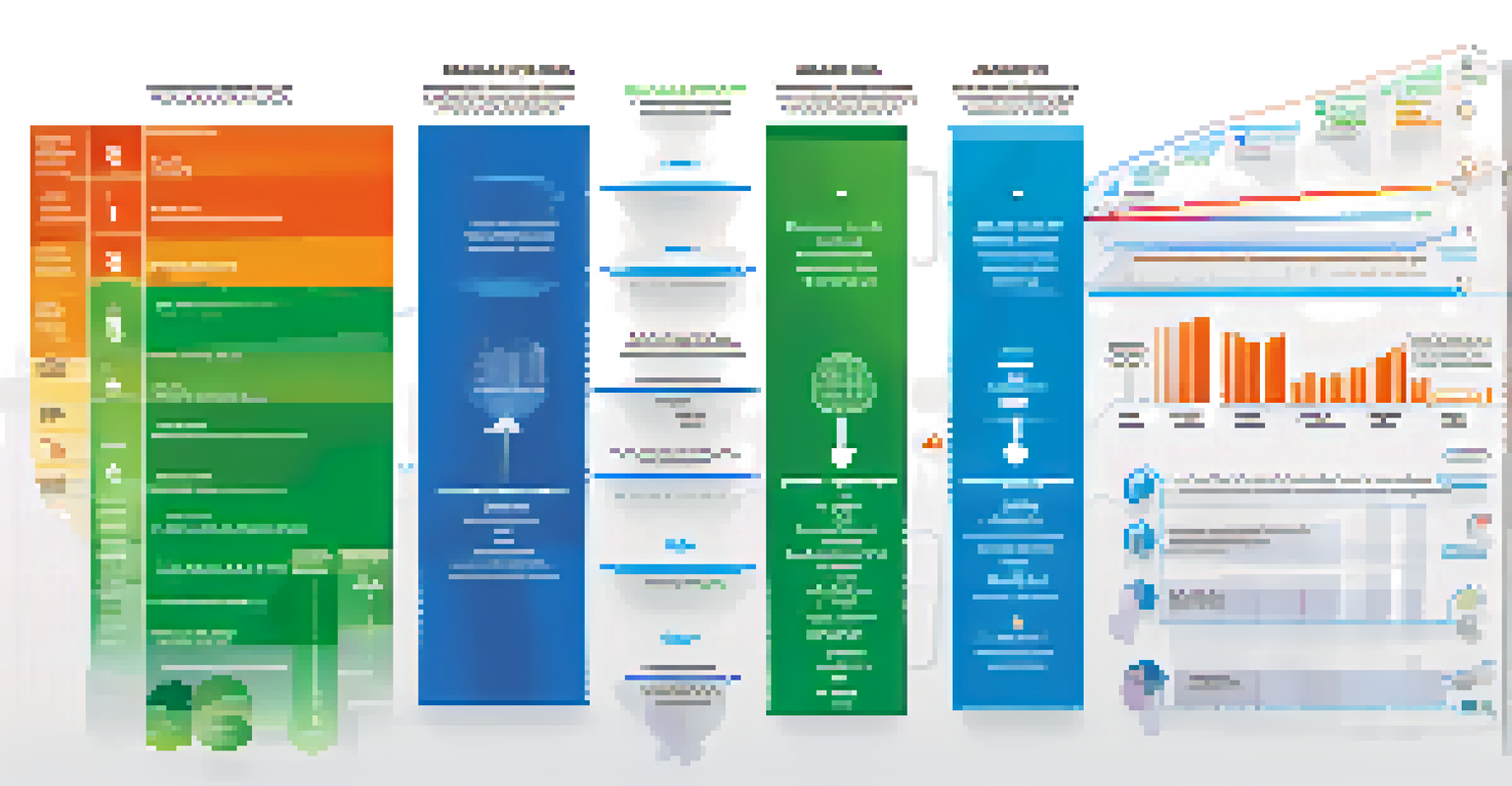The Relationship Between Economic Indicators and Stock Prices

What Are Economic Indicators and Why Do They Matter?
Economic indicators are statistics that provide insight into the health of an economy. They can include metrics like GDP growth, employment rates, and inflation. Investors closely monitor these indicators as they offer clues about future market performance.
Economic indicators are the pulse of the economy; they tell us where we are and where we might be headed.
For example, a rising employment rate often suggests that consumers have more disposable income, which can lead to increased spending. This, in turn, can boost corporate earnings and drive stock prices higher. Understanding these indicators helps investors make informed decisions.
In essence, economic indicators serve as a compass for navigating the complex world of investing. By keeping an eye on these metrics, investors can better anticipate market movements and adjust their strategies accordingly.
The Role of GDP in Stock Market Predictions
Gross Domestic Product (GDP) is one of the most critical economic indicators. It measures a country's economic performance by calculating the total value of goods and services produced over a specific period. When GDP is on the rise, it often signals a thriving economy, which can positively impact stock prices.

For instance, if a country reports higher-than-expected GDP growth, it can lead to increased investor confidence. This often results in a surge in stock prices as investors anticipate higher profits for companies. Conversely, stagnant or declining GDP can lead to market downturns, as fear and uncertainty take hold.
Economic Indicators Guide Investors
Economic indicators like GDP, employment rates, and inflation provide crucial insights that help investors navigate market trends.
Ultimately, GDP serves as a vital barometer for stock market activity. Investors use this data to gauge whether the economy is expanding or contracting, informing their investment strategies and risk assessments.
How Employment Rates Influence Market Confidence
Employment rates are another key economic indicator that directly affects stock prices. A low unemployment rate generally signals a robust economy, where businesses are hiring and consumers are spending. This creates a positive feedback loop, encouraging further investment in the stock market.
In investing, what is comfortable is rarely profitable.
On the flip side, rising unemployment can lead to decreased consumer spending, which can negatively impact corporate earnings. For example, if companies start laying off workers, it may signal trouble ahead, prompting investors to sell off stocks and resulting in price declines.
Therefore, monitoring employment trends is crucial for investors. By understanding labor market dynamics, they can anticipate potential shifts in market sentiment and adjust their portfolios accordingly.
Inflation Rates: The Double-Edged Sword
Inflation is a measure of how much prices for goods and services are rising, and it can significantly impact stock prices. Moderate inflation can indicate a growing economy, but when inflation rises too quickly, it can lead to increased costs for businesses and erode consumer purchasing power.
For instance, if inflation rates soar, the Federal Reserve may decide to increase interest rates to combat rising prices. Higher interest rates can make borrowing more expensive, which can slow down economic growth and, in turn, negatively affect stock prices.
GDP Signals Economic Health
A rising GDP often indicates a thriving economy, which can boost investor confidence and drive stock prices higher.
Investors must be vigilant about inflation trends. Understanding how inflation impacts corporate profitability and consumer behavior is essential for making well-informed investment choices.
Interest Rates and Their Effect on Investments
Interest rates are the cost of borrowing money, and they play a crucial role in the economy and stock market. When interest rates are low, borrowing is cheaper, which encourages businesses to invest, expand, and hire. This often leads to higher stock prices as companies grow and generate more profits.
Conversely, when interest rates rise, the cost of borrowing increases, making it more challenging for companies to finance growth. This can lead to decreased corporate earnings and falling stock prices. For example, if the Fed raises rates to control inflation, investors may react by selling off stocks.
As such, monitoring interest rate trends is vital for investors. Understanding the implications of rate changes allows for better anticipation of market shifts and investment strategies.
Consumer Confidence: The Heartbeat of the Economy
Consumer confidence measures how optimistic or pessimistic consumers feel about the economy's prospects. High consumer confidence often leads to increased spending, which can drive stock prices up as companies report better earnings. It’s like a ripple effect; when consumers feel good, businesses thrive.
On the contrary, if consumer confidence wanes, it may signal economic trouble ahead. For instance, during times of uncertainty, consumers might cut back on spending, leading to reduced sales for businesses and lower stock prices. This can create a cycle of fear that further depresses market sentiment.
Consumer Confidence Drives Spending
High consumer confidence typically leads to increased spending, positively impacting corporate earnings and stock prices.
Therefore, keeping an eye on consumer confidence surveys can provide valuable insights into stock market potential. It’s a useful indicator of how the broader economy may perform in the near future.
Global Events and Their Impact on Economic Indicators
Global events, such as geopolitical tensions or natural disasters, can influence economic indicators and, subsequently, stock prices. For example, a conflict in a major oil-producing region can lead to spikes in oil prices, affecting inflation and consumer behavior in various countries.
These global dynamics can create volatility in stock markets, as investors react to news and forecasts. A sudden shift in an economic indicator due to an unforeseen global event can lead to rapid changes in market sentiment, prompting buying or selling.

Understanding the interconnectedness of global events and economic indicators is essential. Investors who stay informed about world events can better anticipate their potential impacts on stock prices and make more strategic decisions.
Conclusion: The Interplay Between Indicators and Stock Prices
In conclusion, the relationship between economic indicators and stock prices is complex but vital for investors to understand. By analyzing indicators such as GDP, employment rates, and inflation, investors can gain valuable insights into market trends and potential future movements.
It's important to remember that while these indicators provide useful data, they are not foolproof predictors of stock prices. Market sentiment, global events, and investor behavior can all influence outcomes in unpredictable ways.
Ultimately, staying informed and adaptable is key. By keeping an eye on economic indicators and understanding their implications, investors can navigate the stock market more effectively and make decisions that align with their financial goals.